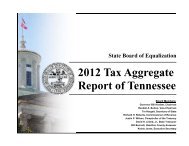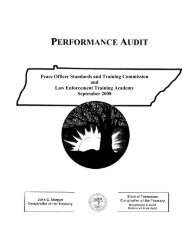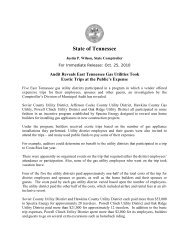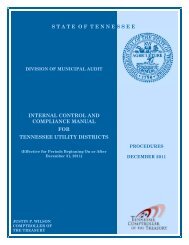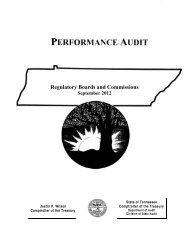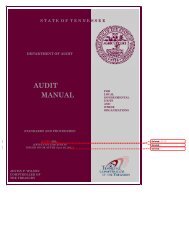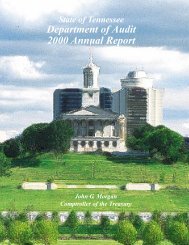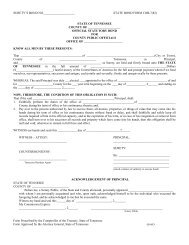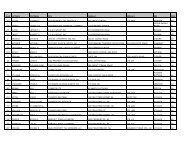On 06/30/2013 the Audit Manual was updated. For a markup copy ...
On 06/30/2013 the Audit Manual was updated. For a markup copy ...
On 06/30/2013 the Audit Manual was updated. For a markup copy ...
Create successful ePaper yourself
Turn your PDF publications into a flip-book with our unique Google optimized e-Paper software.
SECTION B<br />
REPORTING AND AUDITING REQUIREMENTS<br />
TENNESSEE COUNTIES<br />
(INCLUDING RELATED COMPONENT UNITS)<br />
Background<br />
County government in Tennessee may be structured in several ways. The Constitution of <strong>the</strong><br />
State of Tennessee states that <strong>the</strong> General Assembly may provide alternate forms of county<br />
government, including <strong>the</strong> right to charter. The Constitution also allows a county to organize<br />
under a consolidated form of government.<br />
Numerous state statutes and private acts, as well as rules and regulations, govern a county’s<br />
financial operations. (GO TO SELECTED LAWS – APPENDIX D) Additionally, <strong>the</strong> county<br />
legislative body may enact resolutions establishing policy or procedure, authorize various<br />
activities, and transact o<strong>the</strong>r business such as adopting budgets, filling vacancies, creating<br />
boards or authorities, making appointments to boards or authorities, and authorizing <strong>the</strong><br />
issuance of bonds and notes.<br />
In each county, <strong>the</strong>re are a minimum of 11 county offices:<br />
1. County Trustee 7. General Sessions Court Clerk<br />
2. County Mayor 8. Chancery Court Clerk and Master<br />
3. Department of Education 9. Register<br />
4. Department of Highways 10. Sheriff<br />
5. County Clerk 11. Assessor of Property<br />
6. Circuit Court Clerk<br />
The county mayor serves as <strong>the</strong> chief fiscal officer of a county, although <strong>the</strong> mayor has little<br />
control over <strong>the</strong> assessment of property, <strong>the</strong> collection of property tax, <strong>the</strong> salaries and<br />
disbursements of o<strong>the</strong>r elected county officials, and some county-owned institutions. In most<br />
counties, <strong>the</strong> county mayor is responsible for administering general county operations. The<br />
education and highway departments make up <strong>the</strong> o<strong>the</strong>r primary areas of a county government’s<br />
fiscal operations. These three offices or departments are known as a county’s “program<br />
agencies.” The county trustee, as <strong>the</strong> treasurer for <strong>the</strong> county, collects taxes and o<strong>the</strong>r revenues<br />
B-1



